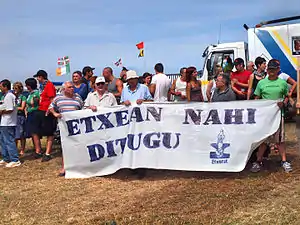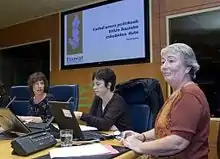Etxerat
Etxerat (Basque: [e t͡ʃeɾat ], meaning 'Homeward') is an association of family members of people who have been imprisoned or exiled because of their activity in support of the Basque National Liberation Movement. Most of those prisoners and exiles are members, or former members, of the Basque armed terrorist organization ETA. Others were not members of ETA but have been jailed for collaborating with it, or have been convicted of other crimes such as belonging to illegal organizations like SEGI or Gestoras pro Amnistía, belonging to or trying to rebuild banned political parties such as Batasuna and Askatasuna, participating in Kale borroka, or for the "public glorification of terrorism". Etxerat's primary activities are to support those family members, and to campaign to defend the rights of their imprisoned and exiled relatives.
 | |
| Founded | 1991 |
|---|---|
| Type | Non-profit NGO |
| Focus | Prisoners and exiles of Basque National Liberation Movement |
| Headquarters | Hernani, Gipuzkoa, Spain |
| Services | Supporting families of imprisoned and exiled persons |
| Method | Legal advocacy, Media attention, direct-appeal campaigns, lobbying |
Key people | Fermina Villanueva, President |
| Website | www |
History
Etxerat, originally called Senideak ('Relatives' in Basque), was created on 6 October 1991.[1][2] In 1989 the Spanish Government had begun sending Basque prisoners involved in the separatist movement to prisons all over Spain. This 'dispersion of prisoners' caused the family members of those prisoners to feel that they were being punished even though they had done nothing wrong. This led them to form an association to speak on their behalf.[3] In addition to this it has been suggested that an additional motive was that the families of the prisoners were unhappy with the way the organisation Amnistiaren Aldeko Batzordeak, which up until then campaigned on behalf of the prisoners, was undertaking this task.[1]
In December 2001 Senideak changed its name to Etxerat.[4][5]

Its current logo is a reversed version of the lamp in Pablo Picasso's painting Guernica.
Summary of its aims
The aims of Etxerat are to achieve an end to the policy of dispersion of prisoners used by the French and Spanish Governments,[6][7] to assist and support family members of Basque nationalist prisoners and exiles,[8][9] and to bring to public attention the conditions in which those prisoners and exiles live.[10]
Dispersion of prisoners
Etxerat's main campaign is to end the French and Spanish Governments' policies of dispersing to prisons all over France and Spain those people imprisoned because of their activity within the Basque separatist movement.[11][12][13] Etxerat claims that this forces the family members of those prisoners to travel huge distances, often hundreds of miles, just to visit their relatives for a couple of hours.[14][15] Etxerat considers this a punishment of those family members and claims that it infringes their human rights to maintain frequent contact with their imprisoned family members.[16] The ending of this policy has substantial public support in the Basque Country,[17][18][19] and is also supported by Pablo Iglesias, the leader of the main anti-austerity party in Spain, Podemos.[20]
The Spanish Government considers that the dispersion of prisoners connected to ETA is a benefit to them, because being separated from other more radical prisoners allows any who want to leave ETA the opportunity to do so.[21] In 2014 the Prime Minister of Spain, Mariano Rajoy, said that the policy does the prisoners a "big favour" by helping them in the process of reintegration into society.[22]
Activities

Etxerat undertakes a range of activities supporting these prisoners and their families. They include:
- Lobbying decision makers, such as the Basque Government, Spanish Government and the European Parliament, to take action to safe-guard the rights of the prisoners.[23][24]
- Publishing a monthly list of the prisoners they support, with details of health problems that any are suffering and reports of any mistreatment that the prisoners or family members have claimed.[25][26]
- Organising a coach that travels to Andalusia from the Basque Country every Friday so that friends and families of the prisoners jailed there can travel together and save on the cost of travelling.[27][28]
- Organising press conferences in order to publicise specific issues relating to the prisoners.[29][30]
- Undertaking projects to improve the lives of prisoners and their families.[31][32]
- Organising demonstrations on the streets of Basque cities.[33][34][35]
Prisoners
There are currently over 300 prisoners which Etxerat seeks to support.[25] Most of these were members of ETA when arrested and have been convicted of terrorist activities. Some committed murder during ETA's violent campaign. Others have been jailed because they have links to ETA such as through their membership of banned organizations like SEGI or Gestoras pro Amnistía, or banned political parties such as Batasuna and Askatasuna. Still more have been jailed for collaborating with ETA, or participating in Kale borroka, or for the "public glorification of terrorism".[36][37][38]
Exiles
There are currently around 300 'exiled' people with some connection to ETA.[39] Some are exiled because they are actually wanted by the Spanish judiciary, and others because they believe they might be in the future. Around 100 are in France with the majority of the rest living in Mexico and Venezuela.[39]
Criticism
Some politicians have claimed the Etxerat is part of ETA's network,[40] however an attempt to make it illegal in 2009 failed.[41][42] In 2010 Carlos Urquijo of the Popular Party asked the Basque Government to prevent Etxerat from holding its annual meeting, because he said it was wrong that they should be allowed to criticise prison policy and call their imprisoned relatives "Political prisoners".[43]
Government support
Etxerat, and its predecessor Senideak, have received financial support from the Basque Government since the 1990s.[44][45] Much of this was to cover the transport costs of family members visiting these prisoners.[5][44] In 2009 this payment was suspended by the Spanish Government.[44][45] In addition to these transport costs the Basque Government has given Etxerat grants so that it can undertake projects, such as improving the educational opportunities of the prisoners.[31][46] These grants are sometimes withdrawn or reduced by the Spanish Government official responsible for oversight of the Basque Country ('Delegado del Gobierno en el País Vasco'). In the most recent case this was because the Spanish Government took the view that it was not the role of the Basque Government to fund education in prisons outside the Basque Country.[47][48]
Recent Developments
In March 2015 four members of Etxerat were arrested by the Civil Guard in Spain. The European United Left–Nordic Green Left group in the European Parliament condemned this move, which it categorized as "Political".[8] The arrested individuals were accused of coordinating a "unity of action" policy for the prisoners, but were released without charge after 4 days.[33]
Presidents of Etxerat
References
- ""Senideak", prueba de la división que invade a las Gestoras". ABC, 2 December 1991, page 22. Retrieved 19 May 2015.
- "CONVIVENCIA EN LA PRISIÓN". La Vanguardia, 14 December 1991. Retrieved 20 July 2015.
- "Amnistiaren Aldeko Mugimenduaren Historia, section 28". Internet Archive. Retrieved 27 July 2015.
- "La asociación de familiares de presos Sendiak cambia su denominación". La Gaceta de Canarias, 3 December 2001. Retrieved 19 May 2015.
- "El Gobierno vasco sube un 4% las ayudas para visitas a presos". El Correo, 8 November 2006. Retrieved 20 July 2015.
- "Etxerat se fija como objetivo acabar con la dispersión este año". El Diario Vasco, 17 February 2014. Retrieved 13 July 2015.
- "Etxerat denunciará la criminalización de los familiares en su asamblea del domingo". Naiz, 29 April 2015. Retrieved 7 July 2015.
- "MEPs urge Spain to respect fundamental rights". European United Left/Nordic Green Left European Parliamentary Group. Archived from the original on 7 May 2016. Retrieved 17 June 2015.
- "ETA plantea 16 excarcelaciones sin reconocer el daño causado". El Pais, 13 March 2014. Retrieved 27 July 2015.
- "ETXERAT hilabetekaria". Etxeratxostena. Retrieved 15 June 2015.
- "Documentos incautados en 1993 revelan que los presos de ETA están desmoraliza" (PDF). La Vanguardia, 12 July 1997. Retrieved 13 July 2015.
- "Rajoy no revisará la dispersión de presos si ETA no se disuelve". La Razon, 31 December 2011. Retrieved 13 July 2015.
- "Mintegi pide a España y Francia acabar con la dispersión de presos". El Mundo, 10 November 2012. Retrieved 13 July 2015.
- "EFA demands an immediate end to the dispersion policy against Basque political prisoners". European Free Alliance, 4 March 2015. Retrieved 22 June 2015.
- "Los 900 kilómetros del consejero vasco". El Pais, 21 March 2015. Retrieved 25 August 2015.
- "Marchers in Pamplona demand Basque prisons for Basque separatists behind bars". Spanishnewstoday, 11 December 2014. Retrieved 22 June 2015.
- "Thousands of Basque protesters march for ETA prisoners in defiance of Madrid". The Japan Times, 12 January 2014. Retrieved 22 June 2015.
- "Decenas de miles de personas se manifiestan en Bilbao contra la dispersión de los presos de ETA". Rtve, 10 January 2015. Retrieved 24 June 2015.
- "La marcha contra la dispersión del 10 de enero en Bilbao será silenciosa y sin pancarta". Deia, 12 December 2014. Retrieved 24 June 2015.
- "España: Podemos pide relajar régimen para terroristas de ETA". El Comercio, 23 JUne 2015. Retrieved 22 July 2015.
- "Rajoy defiende la dispersión de los presos de ETA: "no caben excepciones, sería el colmo después de lo que hemos vivido"". Europress, 25 November 2014. Retrieved 22 June 2015.
- "Mariano Rajoy defiende que la dispersión supone "un gran favor" para los presos". Naiz, 25 November 2014. Retrieved 20 July 2015.
- "El lehendakari y Etxerat piden el fin de la dispersión tras reunirse en Vitoria". La Verdad, 25 February 2015. Retrieved 24 June 2015.
- "Etxerat busca apoyos en el Parlamento Europeo para el acercamiento de presos". Deia, 4 March 2015. Retrieved 24 June 2015.
- "Listado/Direcciones". Etxerat. Retrieved 3 November 2014.
- "Monthly report 2013". Etxerat, March 2013. Retrieved 24 June 2015.
- "La Policía ni acudió al lugar mientras un hombre apedreaba el autobús de Etxerat". Gara, 30 August 2010. Retrieved 24 June 2015.
- "Etxerat dice que los presos "están cumpliendo la palabra que han dado" y exige al PNV que "rectifique" sus declaraciones". europapress, 11 July 2014. Retrieved 30 June 2015.
- "Etxerat denuncia la "condena a muerte" impuesta a Uribetxeberria". Naiz, 28 July 2012. Retrieved 24 June 2015.
- "Etxerat condena "la crueldad" del Gobierno y anuncia una manifestación". El Pais, 26 March 2015. Retrieved 22 July 2015.
- "El 'lehendakari' defiende la concesión de ayudas a Etxerat". El Pais, 7 March 2014. Retrieved 17 June 2015.
- "El Ejecutivo rescata las ayudas a los familiares de presos etarras". El Pais, 26 February 2014. Retrieved 22 July 2015.
- "Los detenidos de la Operación Pastor se suman a la manifestación". El Pais, 28 March 2015. Retrieved 23 June 2015.
- "Etxerat acata la orden de Interior y celebra su manifestación con normalidad". Que! 12 September 2009. Archived from the original on 8 May 2016. Retrieved 23 June 2015.
- "Gritos por la independencia y los presos etarras en la manifestación de Bilbao". LIbertad Digital, 2 January 2010. Retrieved 23 June 2015.
- "Prisión para los cinco detenidos de Segi por no presentarse en el juicio". El Mundo, 23 September 2014. Retrieved 22 July 2015.
- "Detenida Jone Amezaga para su ingreso en prisión". El Pais, 15 December 2014. Retrieved 23 June 2015.
- "El Supremo rebaja la condena de Otegi de 10 años a seis y medio al no considerarle dirigente de ETA". rtve, 9 May 2012. Retrieved 6 July 2015.
- "En Venezuela hay otros veinte etarras con causas pendientes". El Mundo, 18 February 2015. Retrieved 25 August 2015.
- "Iturgaiz denuncia en que Etxerat es "una parte del entramado de ETA"". El Pais, 10 March 2015. Retrieved 26 July 2015.
- "El Gobierno vasco prepara la fórmula para ilegalizar Etxerat". El Periódico de Aragón, 26 September 2009. Retrieved 26 July 2015.
- "Ares no ve razones para prohibir manifestación de Etxerat el 2 de enero". El Mundo, 11 December 2009. Retrieved 26 July 2015.
- "El PP pide a Interior que impida la asamblea de Etxerat en Guipúzcoa". eleconomista.es, 5 November 2010. Retrieved 26 July 2015.
- "El Gobierno pide ante el TSJPV la suspensión cautelar de las ayudas a los presos de ETA". El Correo, 7 April 2009. Retrieved 20 July 2015.
- "El Gobierno recurre las ayudas de Ibarretxe a los familiares de presos de ETA". La Rioja, 6 April 2009. Retrieved 20 July 2015.
- "Ibarretxe prima con subvenciones a grupos..." ABC, 2 November 2001. Retrieved 6 May 2015.
- "Carlos Urquijo recurre una ayuda del Gobierno vasco a la asociación 'Etxerat'". Gobierno de España, 6 June 2014. Retrieved 24 June 2015.
- "Urquijo recurre una ayuda de Lakua a Etxerat para garantizar la educación en las prisiones". Naiz, 24 February 2015. Retrieved 24 June 2015.
- "Fallece Santos Sagardui, padre de "Gatza" que fue presidente de Etxerat". Gara, 6 May 2015. Retrieved 16 June 2015.
- "Fallece a los 91 años la presidenta de Etxerat Joxepa Arregi". El Diario Vasco, 26 May 2010. Retrieved 16 June 2015.
- "Etxerat constata el rechazo a la dispersión y lo plasmará el 22-M". Gara, 12 May 2011. Retrieved 15 June 2015.